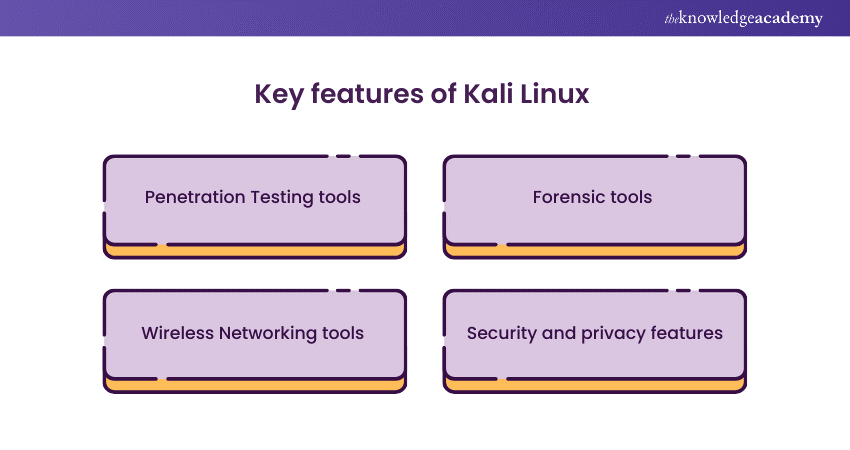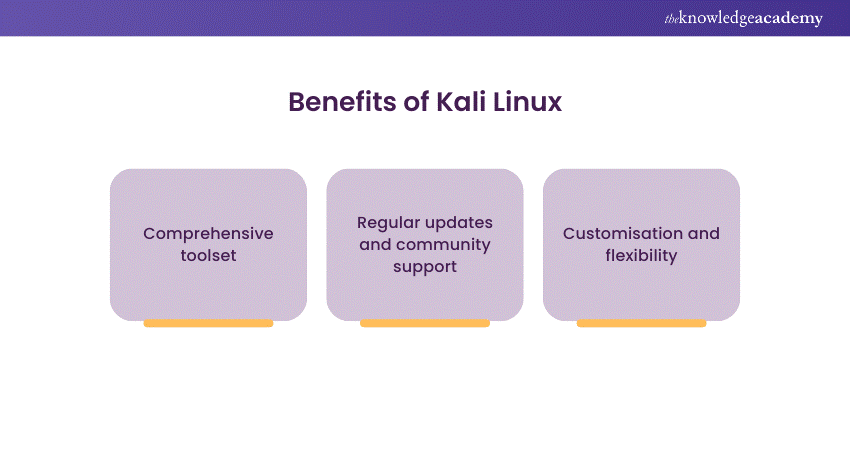We may not have the course you’re looking for. If you enquire or give us a call on +1800812339 and speak to our training experts, we may still be able to help with your training requirements.
Training Outcomes Within Your Budget!
We ensure quality, budget-alignment, and timely delivery by our expert instructors.

Kali Linux is a Linux distribution based on Debian that is specifically designed for conducting Penetration Testing and security auditing tasks. As it can be used on various hardware, it is a very versatile tool for cybersecurity professionals to evaluate and enhance the security of computer systems. Kali Linux has gained an excellent reputation as a powerful tool in the field of cybersecurity. Whether you are a beginner in this field or just curious about Kali Linux's capabilities, this blog is tailored specifically to you.
Table of Contents
1) What is Kali Linux?
2) History of Kali Linux
3) Key features of Kali Linux
4) Different ways to install Kali Linux
5) Benefits of Kali Linux
6) Drawbacks of Kali Linux
7) Conclusion
What is Kali Linux?
Kali Linux is a Debian-based Linux distribution specifically designed for digital forensics and penetration testing. It comes pre-loaded with many tools and programs, making it an indispensable resource for cybersecurity professionals, ethical hackers, and enthusiasts. The name "Kali" is derived from the Hindu goddess of time and change, symbolising the fluid nature of the tools included in the distribution.
History of Kali Linux
The journey of Kali Linux began with its predecessor, BackTrack Linux, which was initially released in 2006. BackTrack gained immense popularity due to its wide array of security tools and features. However, in 2013, Kali Linux officially succeeded, bringing improvements, updates, and a more streamlined development process.
Kali Linux is an open-source project that thrives on community contributions and constant updates. The developers, Offensive Security, have consistently refined and expanded the distribution to keep up with the dynamic landscape of cybersecurity.
Unlock your testing expertise with our Kali Linux Fundamentals Course – Sign up today!
Key features of Kali Linux
The following is the comprehensive list of key features of Kali Linux:

1) Penetration Testing tools
At the heart of Kali Linux are its penetration testing tools. These tools empower cybersecurity professionals to simulate real-world cyberattacks, identifying vulnerabilities in systems and networks. With a vast arsenal that includes tools like Metasploit, Nmap, and Wireshark, Kali Linux is a comprehensive platform for ethical hacking and security assessments.
2) Forensic tools
Kali Linux is equipped with various forensic tools that facilitate digital forensics and incident response. These tools help investigators analyse digital evidence, recover lost data, and reconstruct digital incidents. The distribution supports various file systems and includes tools like The Sleuth Kit and Autopsy.
3) Wireless Networking tools
For professionals engaged in securing wireless networks, Kali Linux provides various tools for wireless penetration testing. Whether it's for cracking Wi-Fi passwords or analysing wireless protocols, Kali Linux is a go-to platform. Aircrack-ng and Reaver are just a couple of examples of the tools available for wireless security testing.
4) Security and privacy features
Kali Linux places a strong emphasis on security and privacy. The Operating system is designed with built-in security mechanisms, ensuring a robust and secure environment for users. Additionally, Kali Linux includes tools for anonymity and privacy, such as Tor and proxy chains, allowing users to conduct tests discreetly.
Learn more about testing with our Tools and Techniques for Penetrating Testing Course – Join today!
Different ways to install Kali Linux
Installing Kali Linux is a straightforward process, and users have multiple options to choose from. The recommended method is downloading the ISO image from the official Kali Linux website and creating a bootable USB drive. This allows users to run Kali Linux in live mode or install it directly on their system.
Alternatively, using software like VirtualBox or VMware, Kali Linux can be installed on virtual machines. This enables users to run Kali Linux alongside their primary Operating system without affecting their existing setup. The flexibility in installation methods makes Kali Linux accessible to a wide range of users, from beginners to experienced cybersecurity professionals.
Master the testing expertise with our Fundamentals of Test Automation Course – Sign up today!
Benefits of Kali Linux
Given below are the advantages of the testing technique in detail:

1) Comprehensive toolset
The primary advantage of Kali Linux is its extensive toolset, which is carefully curated for cybersecurity professionals. Having a broad range of tools in one distribution saves time and effort that would otherwise be spent installing and configuring individual programs.
2) Regular updates and community support
Kali Linux benefits from a proactive community of developers and users who actively contribute to its improvement. Regular updates ensure that the distribution remains current with the latest security tools and techniques. The community support is invaluable for beginners seeking guidance and troubleshooting assistance.
3) Customisation and flexibility
Kali Linux provides users with a high degree of customisation, allowing them to tailor the distribution to their specific needs. Whether it's for adding new tools or tweaking the user interface, Kali Linux offers flexibility that accommodates the preferences of individual users.
Stay at the forefront of testing with our ELT Testing Training – Join today!
Drawbacks of Kali Linux
While Kali Linux is a powerful tool, it's essential to acknowledge its limitations and potential drawbacks. One notable aspect is that the extensive toolset might be overwhelming for beginners. The learning curve can be steep for those new to cybersecurity, and using the tools without proper understanding could lead to unintended consequences.
Additionally, Kali Linux is intended for something other than everyday use as a general-purpose Operating system. Its focus on security tools may need more user-friendly features found in other Linux distributions designed for regular use. Users might need to switch between Kali Linux and another OS for various tasks.
Conclusion
Kali Linux is a powerhouse for cybersecurity professionals and enthusiasts alike. Its rich history, comprehensive toolset, and focus on security make it an indispensable tool in the field of ethical hacking and digital forensics. While it may have a learning curve for beginners, the benefits of using Kali Linux outweigh the drawbacks. So, "What is Kali Linux?" It's not just an Operating system; it's a gateway to the realm of ethical hacking and cybersecurity expertise.
Learn more about testing with our Unit Testing Course – Join today!
Frequently Asked Questions

Kali Linux is primarily used for digital forensics and penetration testing in the field of cybersecurity.

While possible, it's not recommended. Kali Linux is specialised for security tasks; using it as a general-purpose OS may limit regular functionalities.

The Knowledge Academy takes global learning to new heights, offering over 30,000 online courses across 490+ locations in 220 countries. This expansive reach ensures accessibility and convenience for learners worldwide.
Alongside our diverse Online Course Catalogue, encompassing 17 major categories, we go the extra mile by providing a plethora of free educational Online Resources like News updates, Blogs, videos, webinars, and Interview Questions. Tailoring learning experiences further, professionals can maximise value with customisable Course Bundles of TKA.

The Knowledge Academy’s Knowledge Pass, a prepaid voucher, adds another layer of flexibility, allowing course bookings over a 12-month period. Join us on a journey where education knows no bounds.

The Knowledge Academy offers various Automation Courses including Kali Linux, Fundamentals of Test Automation, etc. These courses cater to different skill levels, providing comprehensive insights into Kali Linux skills.
Our IT Security and Data Protection blogs cover a range of topics related to testing skills, offering valuable resources, best practices, and industry insights. Whether you are a beginner or looking to advance your Testing skills, The Knowledge Academy's diverse courses and informative blogs have you covered.
Upcoming IT Security & Data Protection Resources Batches & Dates
Date
 Tools and Techniques for Penetrating Testing
Tools and Techniques for Penetrating Testing
Thu 23rd Jan 2025
Thu 27th Mar 2025
Thu 15th May 2025
Thu 17th Jul 2025
Thu 25th Sep 2025
Thu 13th Nov 2025







 Top Rated Course
Top Rated Course



 If you wish to make any changes to your course, please
If you wish to make any changes to your course, please


